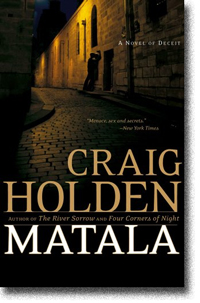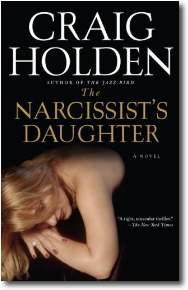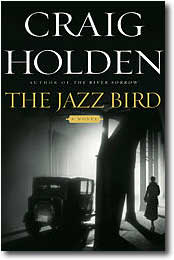More Interviews: Max Barry |
An Interview with Craig HoldenAuthor of Matala
Craig Holden is the author of six novels. After reading The Narcissist’s Daughter, I added Holden to my list of authors to watch out for. His latest novel, Matala, was recently reprinted in paperback. For more information about this author and his wonderful novels, visit the author’s website, www.craigholden.com. This interview was conducted by Guy Savage for MostlyFiction.com (MF). Also, read Savage's review of MATALA and THE NARCISSIST'S DAUGHTER. Also see our earlier review of THE JAZZ BIRD.
CRAIG HOLDEN (CH): Matala is the story of a young woman, Darcy Arlen, who meets a young man named Will on a bridge in Rome. There is a spark. She goes that night to the hostel where he’s staying, and ends up falling into the adventure of her life. Will, it turns out, is a con artist of sorts, and has a partner, an older woman named Justine, who is both attracted to and threatened by Darcy. Once Will and Justine discover some things about Darcy they couldn’t have guessed at, the three depart on a trip to the Mediterranean, where they are to deliver a package for a big payday. On the way, there develops a kind of three way love affair. The nature of the package, and the payday, don’t become clear until the end.
MF: On your website, there’s a photo of the caves of Matala. Did the photo, which was taken in 1979, act as an inspiration for the novel? CH: No, the photo wasn’t taken in ’79. I was there in ’79. I found the photo on the web, pretty much after the book was finished. But the image I had in my head of those caves was an inspiration -- a strange mysterious place I felt the story drawn to.
MF: After reading THE NARCISSIST'S DAUGHTER and now MATALA, I have to say that your plots are very unpredictable. How much do you have mapped out in advance? Do you know how these stories are going to end when you begin?
MF: Which of your novels are you the proudest of? Why? CH: It’s a hard question, because they each really do something different. I don’t like repeating myself, and with each book I take on something I haven’t done before, so I’m proud of each in it’s own way. Having said that, I think that Four Corners of Night and The Jazz Bird were both really well realized books. I think The Narcissist’s Daughter was well realized too, though it went into some places I think a lot of readers didn’t care to go. Matala, I’m not quite sure yet. One of my goals was to find and tell a very tight controlled story, and I did that. So now I’m free to move on from there.
MF: In both THE NARCISSIST'S DAUGHTER and MATALA, sexual relationships are seen as a struggle for dominance and control. Any thoughts on that? CH: I remember sitting in my office once, some years ago, and feeling that I had sort of done the crime thing and wasn’t that interested in doing more of it right then, but also that sex really could be used in the same way as crime or violence – that is as a window into character, a way in that reveals things you wouldn’t otherwise see. And that intrigued me, and so, yes, it did involve struggles for dominance and control. I wasn’t looking to be pornographic or prurient. I wanted these battles. Which sex can of course sometimes be.
MF: In MATALA, Will’s life has been changed forever by his relationship with Justine, and similarly, both their lives alter when they meet Darcy. The introduction of Darcy to the relationship throws the three main characters into a struggle for power and control. Without giving away too much plot here, who (if anyone) is the ‘winner’?
MF: Matala is rife with moral ambiguities, and all three main characters are manipulators to one degree or another. Was it a deliberate decision on your part to create no true innocents here? CH: Sure. The ruse, as I said above, is that Darcy seems like an innocent at first. And when I was writing the book, early on, I thought she was an innocent, that this was somehow a story about these wolves and this lamb. But the only place to go with that is really dark, and I guess for this book I just wasn’t in the mood. When I realized the truth about Darcy, the whole thing fell into place. So it was deliberate to create no true innocents, but at the same time I see in each of these characters a soft core. None of them seem to me to be truly criminal, in a deep character sense. They’re all kind of playing at it. That’s the least true of Justine of course but even she is pretty vulnerable at the end.
MF: You are currently the visiting writer in residence at New Mexico State University at Las Cruces. Please explain this position and its responsibilities. What is the most difficult part of the job? CH: I teach full time, three courses per semester, in both the MFA and undergrad fiction programs, and I teach other classes sometimes, too – creative non-fiction, literature. The program here is in a bit of a transition, and I’ve just been filling some gaps, giving a bit of fresh input. The most difficult thing about it is not having time to write, though it’s actually been really good to take some time off. But I’m now into a new novel and so this semester I’m essentially working two jobs. I’m exhausted and have very little time for anything else. But I really like the teaching, the students, the reading, and the writing community here, which is quite active. It’s been a fun two years.
|
|
CH: Yes. Going from graduate school to New York, from the academy to the marketplace, Teaching has had a huge effect, and from the opposite pole, as it were, from New York. To be able to sit around with very smart people and talk about narrative theory, genre theory, free indirect discourse, the parsing of stories, approaches to work, etc, is a dream. With all the reading I’ve done here, I feel like I’ve done a second MFA myself. I know it’s had an effect on my writing, which is showing up in the new book.
MF: When you are working on a novel, do you allow yourself to read or do you prefer to channel all your energies on writing? CH: Reading is a great help and release when I’m writing. But I generally don’t read anything that seems like it might be along the lines of what I’m working on. I read widely, though most of it is fairly literary. I rarely, for instance, read commercial thrillers or mysteries.
MF: What would you like your readers to take away from reading Matala? CH: I’d like them to have fun. I think the ending feels a bit enigmatic, and I hope they leave feeling satisfied by that, though in some ways it is probably not as satisfying as some would like. But everything is there that needs to be.
MF: What’s next? CH: This new one feels like a bigger book. It feels ambitious. I’ve had some time off from writing, and I am really full of energy, and that’s coming out in this manuscript. But I’m just at the beginning, so I don’t really know what’s going to happen.
MF: Well then, I better let you get back to it! Thank you for taking time out of your busy schedule. We at MostlyFiction.com can't wait to see what you do with the next novel. Read our review of Matala at MostlyFiction.com
|
©1998-2012 MostlyFiction.com |


 CH: I generally map out very little from the beginning. With Matala I had written a brief scenario of the story, so I had some idea. I knew it moved from Rome to Matala, and that it involved these two young travelers, Will and Darcy, who meet in Rome. I think I may have had some inkling of Justine’s presence by the time I wrote the synopsis for my publisher. Beyond that, it was just faith in the idea that putting these three people on the road together had to lead to something fun.
CH: I generally map out very little from the beginning. With Matala I had written a brief scenario of the story, so I had some idea. I knew it moved from Rome to Matala, and that it involved these two young travelers, Will and Darcy, who meet in Rome. I think I may have had some inkling of Justine’s presence by the time I wrote the synopsis for my publisher. Beyond that, it was just faith in the idea that putting these three people on the road together had to lead to something fun.
